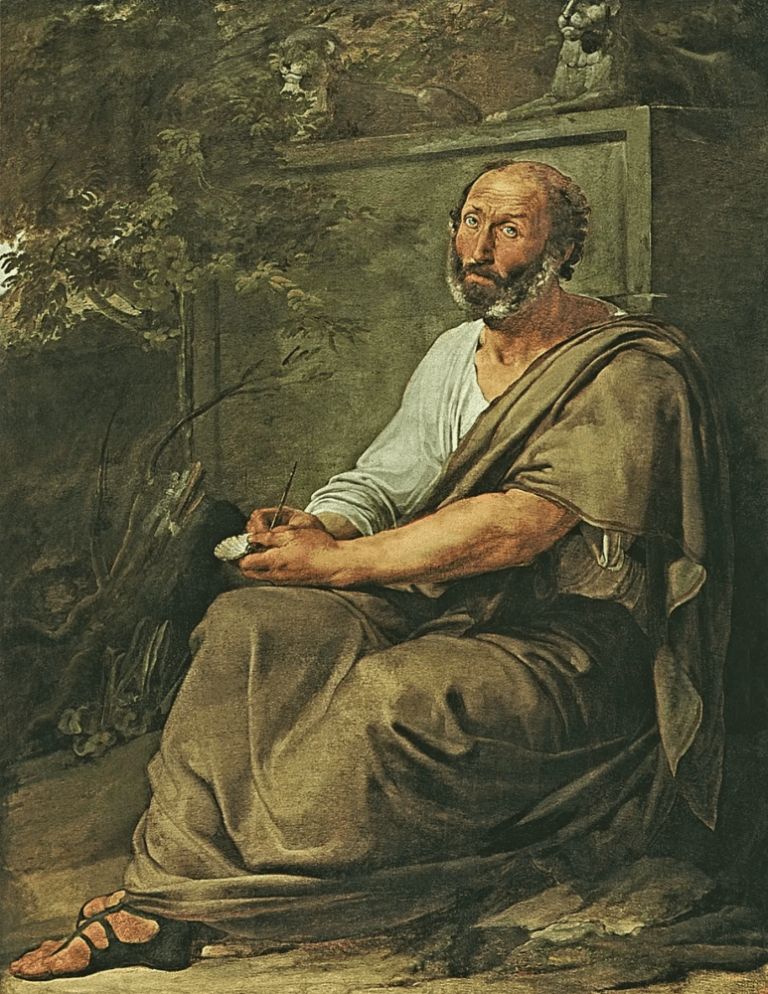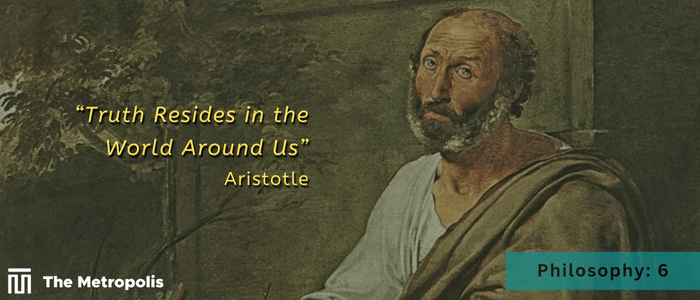Hasan Mahmud –
Aristotle was a philosopher and scientist who lived in ancient Greece from 384 BC to 322 BC. He was a student of Plato and tutored Alexander the Great. Aristotle’s teachings have had a significant impact on Western philosophy and modern science.
The concept of truth was one of Aristotle’s most significant contributions to philosophy. He believed that truth can be found by observation and reason and that it is present in the world around us.

According to Aristotle, learning comes from experience, and the senses give us the knowledge we need to comprehend the universe. He made the case that our senses provide us with information, and that reason is necessary to interpret that information to find the truth. Since scientists think that truth may be found by testing and observation, this principle has also affected modern science.
Aristotle’s view that truth can be found in the world around us marked a significant break from Plato’s outlook. According to Plato, the truth can only be found in thoughts rather than in the real world. He thought that the physical world was just an illusion and that these ideas represented the real world. Aristotle disagreed, contending that real reality is found in the physical world and that abstract ideas are merely ways of portraying it. He believed that the only true source was the physical world and that it was our responsibility to look for it.
According to Aristotle, truth is a question of agreement between our beliefs and the world’s actual facts. He held the opinion that there is a real world out there and that our ideas of it ought to match what is there. He maintained that our opinions are only accurate if they reflect the reality of the world. Finding the reality of things was what Aristotle meant by the quest for truth, which was more than just a matter of opinion or personal preference.
Aristotle held the view that seeking the truth is an ongoing undertaking. He thought that our knowledge of the world around us is continually expanding and altering and that our worldview ought to be continuously revised as we amass new information. He held that searching for the truth is a constant process and that we should always be receptive to new knowledge and fresh perspectives.
The idea of causality is one of Aristotle’s most well-known contributions to the study of truth. He held the view that everything in the world has a cause-and-effect relationship, and that we can better understand the world by learning about its causes.
Aristotle believed that the search for truth involved not only learning what is true but also learning why things are the way they are. The creation of the scientific method was affected by this theory, which has had a significant impact on modern science. To determine the causes and effects of natural events, scientists established the scientific method, which is based on observation and experimentation.
Aristotle’s perspectives on the natural world had an impact on his ideas about truth as well. He thought that the natural world was predictable and orderly and that we could learn the truth about the world around us by comprehending natural laws. He had the opinion that nothing in the natural world happens by accident and that everything has a purpose.
Aristotle’s ideas about human nature also had an impact on his conceptions of truth. He thought that humans are logical beings and that what distinguishes us from other animals is our capacity for logic and reason. He believed that by employing reason, we might learn more about the world and that our capacity for reason and logical thought enabled us to learn the truth about it.
The influence of Aristotle on current thought is substantial. Thomas Aquinas and Immanuel Kant were two of the major thinkers in the Western tradition who were affected by his ideas about truth and his approach to learning. The evolution of science was significantly influenced by Aristotle’s ideas about truth and reason since many scientists followed his approach to observing and comprehending the universe.
However, this concept has been the subject of discussion and dispute among numerous philosophers, academics, and thinkers for many years. Various schools of thought, such as skepticism, relativism, and subjectivism, have contested the assumption that truth can be found in the world around us.
Skepticism is a philosophical perspective that argues that it is impossible to know anything with certainty. The skeptics contend that human perceptions and experiences determine what is true and what is false. They contend that there are no absolute facts and that all knowledge is biased and depends on individual perspectives. Skeptics contend that as the world is constantly evolving and adjusting to various situations, the truth cannot be discovered there. They contend that it is impossible to know anything with certainty and that there is no way to distinguish between what is true and what is untrue.
Relativism is another philosophical perspective that challenges Aristotle’s belief in the objective truth of the world around us. According to relativism, truth is relative to different cultures, societies, and periods. According to relativists, there is no such thing as a universal truth, and what is true in one culture might not be true in another. They hold that truth is arbitrary and depends on one’s experiences, cultural expectations, and worldview.
Subjectivism is a philosophical perspective that argues that truth is dependent on individual perspectives and experiences. According to subjectivists, there is no such thing as objective truth and all knowledge is derived from one’s own biases, views, and convictions. They contend that since the world is ever-changing and adaptable to various situations, the truth cannot be discovered there. They hold the view that it is impossible to know anything with absolute certainty and that there is no way to distinguish between what is real and what is untrue.
Despite the difficulties given by subjectivism, relativism, and skepticism, Aristotle’s conviction that the world is objectively true continues to be a key philosophical foundation. Many philosophers contend that truth can be found in the world, but that to distinguish between what is true and what is false, careful observation and analysis are necessary. They hold that truth may be discovered by critical thinking and scientific inquiry and that truth is impartial and free from one’s prejudices, opinions, and beliefs.
This notion is still prevalent in modern popular culture. A key tenet of contemporary thought is the idea of truth as an objective reality distinct from human perception. To understand the world and its place in it, people are still looking for the truth. Various forms of popular culture, such as literature, film, and television, reflect this quest for the truth.
Literature is one of the most important mediums for exploring truth in popular culture. Poetry and novels have long been employed as vehicles for introspection into the nature of reality and the human condition. For instance, Scout Finch, the main character in Harper Lee’s “To Kill a Mockingbird”, learns the truth about the world through her experiences and observations. Similar torture is used to force Winston Smith to accept a fictional world in George Orwell’s “1984”, which highlights the risks associated with twisting the truth.
Exploring reality in popular culture also involves film and television. The issue of truth and its connections to authority, justice, and morality is explored in several films and television programs. For instance, the main character Neo in the movie “The Matrix” discovers the truth about the universe and himself and then battles to hold onto that idea. The concept of truth is also explored in the well-known TV program “The X-Files”, which follows FBI agents Mulder and Scully as they look into paranormal and extraterrestrial occurrences to learn the truth.
Science also reflects the notion of truth as an immutable reality that exists apart from the human perspective. As scientists work to comprehend the natural world and the principles that govern it, science is frequently represented in popular culture as a means of learning the truth. For instance, mathematician Alan Turing decodes encrypted messages during World War II in the movie “The Imitation Game”, which helps viewers grasp reality better.
Additionally, the political scene also reflects the pursuit of truth. Politicians are frequently portrayed in popular culture as pursuing justice and truth, whether it be through the promotion of equality, the defense of human rights, or the preservation of the environment. For instance, the President of the United States defends the truth in both his personal and professional life in the movie “The American President”.
The pursuit of truth is also apparent in spirituality and religious convictions. Many people in popular culture seek truth by following their religious or spiritual convictions to comprehend what life, death, and the existence of a higher force mean. For instance, two terminally sick men set out on a journey to achieve their goals and discover the truth about their life in the movie “The Bucket List”.
In conclusion, Aristotle believed that truth resides in the world around us. He held that the path to truth was through our senses, reason, and experience. He held that the patterns that arose from our observations, the knowledge that had been amassed over time, and our experiences formed the basis of our understanding of the world. Aristotle’s view that truth might be discovered in the material world marked a significant divergence from the ideas of his predecessor Plato and has had an impact on thought for more than two thousand years.



